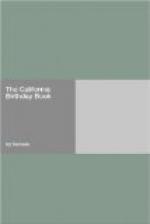For all the toll the desert takes of a man it gives compensations, deep breaths, deep sleep, and the communion of the stars. It comes upon one with new force that the Chaldeans were a desert-bred people. It is hard to escape the sense of mastery as the stars move in the wide, clear heavens to risings and settings unobscured. They look large and near and palpitant; as if they moved on some stately service not needful to declare. Wheeling to their stations in the sky, they make the poor world fret of no account. Of no account you who lie out there watching, nor the lean coyote that stands off in the scrub from you and howls and howls.
MARY AUSTIN,
in The Land of Little Rain.
APRIL 5.
DESERT CALLS.
There are breaks in the voice of the shouting
street
Where the smoke drift comes
sifting down,
And I list to the wind calls, far and
sweet—
They are not from the winds
of the town.
O I lean to the rush of the desert air
And the bite of the desert
sand,
I feel the hunger, the thirst and despair—
And the joy of the still border
land!
For the ways of the city are blocked to
the end
With the grim procession of
death—
The treacherous love and the shifting
friend
And the reek of a multitude’s
breath.
But the arms of the Desert are lean and
slim
And his gaunt breast is cactus-haired,
His ways are as rude as the mountain rim—
But the heart of the Desert
is bared.
HARLEY R. WILEY,
in Out West Magazine.
APRIL 6.
In the universal pean of gladness which the earth at Eastertide raises to the Lord of Life, the wilderness and the solitary place have part, and the desert then does in truth blossom as the rose. And how comforting are the blossoms of the desert when at last they have come! When the sun has sunk behind the rim of the verdure-less range of granite hills that westward bound my view, and the palpitating light of the night’s first stars shines out in the tender afterglow, I love to linger on the cooling sands and touch my cheek to the flowers. Now has the desert shaken off the livery of death, and ... is become an abiding place of hope.
CHARLES FRANCIS SAUNDERS,
in Blossoms of the Desert.
APRIL 7.
There had been no hand to lay a wreath upon his tomb. But soon, as if the weeping skies had scattered seeds of pity, tiny flowerets, yellow, blue, red, and white, were sprouting on the sides of the grave. * * * A delicious perfume filled the air. The desert cemetery was now a place of beauty as well as a place of peace. But the silence and solitude remained unbroken, except when a long-tailed lizard scurried through the undergrowth, or a big horned toad, white and black, like patterned enamel, took a blinking peep of melancholy surprise into the yawning ditch that blocked his accustomed way.




